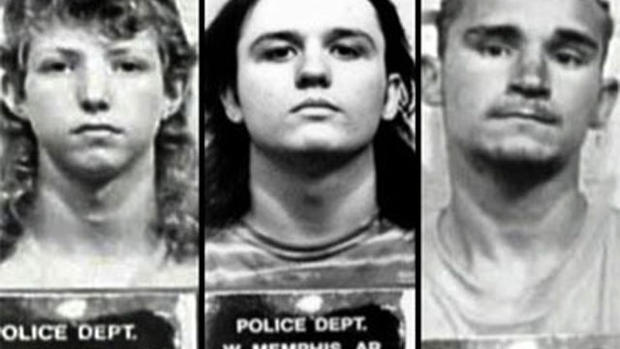Freed West Memphis 3: Like kids at Christmas
A lawyer for Damien Echols - one of the so-called West Memphis 3 freed from death row in Arkansas - said his client celebrated his first night of freedom in 18 years.
Steven Braga, the attorney for Damien Echols, told "The Early Show on Saturday Morning" that his client's first night of freedom was "unbelievable."
He described a celebration last night Echols and James Baldwin, shared with supporters in Memphis: "It was as if you could see two little 5-year-old kids at their first Christmas. They were trying food they had never seen before, they were fascinated by a cell phone, more fascinated by an iPhone and then the idea you could take pictures with an iPhone totally blew them away, so they were taking a lot of pictures."
CBS Affiliate WREG reports that the third freed man, Jesse Misskelley, opted to celebrate with family Friday.
Echols, Baldwin and Misskelley were teenagers in 1994 when they were convicted of killing three eight-year-old boys - Steve Branch, Christopher Byers and Michael Moore.
Investigators in this rural community believed that the teenagers (who wore black and listened to heavy metal music) killed the children as part of a satanic ritual. Echols was sentenced to death; Baldwin and Misskelly both got life in prison.
Over the years doubts emerged about their guilt and several celebrities pushed to have them set free, reports "48 Hours" correspondent Erin Moriarty. DNA evidence has been recovered at the scene, none of it linking the accused to the crime.
Baldwin almost turned down the deal that freed him and the others from prison yesterday, but it wasn't just about him. The highly unusual plea agreement meant that his friend Echols - on death row for 17 years - would get his life back.
"Still very much in shock, still overwhelmed," said Echols Friday.
Their freedom comes at a high price: Under the agreement, known as an Alford plea, the men who still say they are innocent had to plead guilty to murder.
"'We'll let you go only if you admit guilt,'" Baldwin described it. "That's not justice, no matter how you look at it.
The family of the victims' reaction to the outcome has been mixed. One father, John Mark Byers, voiced his support for releasing the men - he thinks they're innocent. Another had to be removed from the court after an outburst.
Moriarty described the process that freed the three men as a "face-saving move" for prosecutors: "Even the prosecuting attorney admitted yesterday these guys were eventually going to get a trial, it might have taken two years but they were going to, and there is no evidence to tie them to it any more. They would have been acquitted. So this way they get their guilty pleas, they look good, and these guys get out. It's not a perfect deal."
"What was your client's reaction when you told them you were going to go home?" anchor Russ Mitchell asked Braga.
"Total shock," Braga said. "It all happened so quickly, we reached a point with the prosecution where we thought negotiations would be productive. They were, but it took less than two and a half weeks to get this deal done, so everybody was in shock."
Mitchell asked if it was difficult for Braga to convince his client to plead guilty as part of his release.
"It was, it's logically tough," he said. "The way the deal was circulated, we were the ones who initiated it on behalf of Damien. His decision was actually a lot easier because he was under threat of execution, he was living in solitary confinement on death row. He had to get out of there, so his decision was pretty easy.
"Jason Baldwin is the young man who is really the hero today. He had a very difficult decision to make: He wanted to fight to the end to get found innocent in court, but he recognized that if he took the deal he could free Jesse and Damien and himself, but more importantly save Damien's life.
Braga said there were several turning points in the case which has attracted increased attention in recent years.
"I think there were three turning points that helped make this resolution possible, three new things," he said. "A lot of new evidence, DNA evidence ... new witnesses, different things coming to fore. A new hearing, the Arkansas Supreme Court gave these young men a new hearing last November in a ruling that was unprecedented and that hearing was coming up in December so there was some pressure there.
"Perhaps most importantly, a new judge. The trial judge who had been on the case for 17 years was elected to the State Senate. A new judge, David Laser, was appointed, and that brought a fresh perspective to the whole case."
When asked what Echols would say to the community, some of whom still believe he was culpable in the deaths of the three scouts, Braga replied, "Well, they're wrong. He's absolutely innocent, and the boys and their lawyers and their supporters will continue to look for that piece of evidence that nobody could refute.
"We'll find it someday, whether it's a deathbed confession, somebody comes forward or some actual inculpatory DNA of the real killer. He's still out there. The right guys have been set free."
